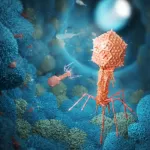(Press-News.org) Long-term consumption of water with fluoride levels far above established drinking water standards may be linked to cognitive impairments in children, according to a new pilot study from Tulane University.
The study, published in the journal Neurotoxicology and Teratology, was conducted in rural Ethiopia where farming communities use wells with varying levels of naturally occurring fluoride ranging from 0.4 to 15.5 mg/L. The World Health Organization recommends fluoride levels below 1.5 mg/L.
Researchers recruited 74 school-aged children and rated their ability to draw familiar objects such as a donkey or a house, with scores reflecting any missing details. They used a standard computerized memory test which is language and culture neutral as another tool to measure cognitive ability.
The study found that higher exposure to fluoride in drinking water was linked to more errors on the drawing and memory tests. Lead author Tewodros Godebo, assistant professor of environmental health sciences at Tulane University School of Public Health and Tropical Medicine, said the “causal relationship between fluoride exposure and neurotoxicity remains unclear” but he hopes these preliminary findings will spur more research into the potential cognitive impacts of fluoride exposure.
“Though further epidemiological studies are needed to validate the findings, these results add to the growing concern about the potential neurotoxic effects of fluoride, especially during early brain development and childhood,” Godebo said. “These tests affirmed a clear association between high fluoride and cognitive impairment.”
Fluoride is essential for preventing tooth decay. However, excess intake of fluoride has been linked to lower IQs in past epidemiological studies in rural communities in China and India.
Additionally, past animal research has shown that fluoride can cross the placenta and blood-brain barriers. In regions with no alternative water sources, this means excess fluoride exposure could be a chronic issue that begins at conception.
Over 200 million people worldwide are estimated to be exposed to high fluoride levels in their drinking water. The Ethiopian Rift Valley, where this study was conducted, is an ideal research area for investigations of potential impacts because those raised in the area have consistent exposure to stable, naturally occurring fluoride levels and share similar lifestyles with surrounding villages, limiting the risk of confounding factors.
Godebo hopes to replicate the results in Ethiopia with a larger cohort of children and study the cognition of children in low-fluoride Ethiopian communities for potential signs of cognitive impact.
"We have a unique opportunity to study low fluoride communities in the same setting as high fluoride communities, so we can determine if fluoride is a neurotoxicant at low levels,” Godebo said. “Such studies are important to the public and government agencies to determine the safety and risk of water fluoridation in drinking water supply systems.”
Co-authors for the study included Nati Pham and Arti Shankar of Tulane University, Marc Jeuland of Duke University, Amy Wolfe of University of Kentucky, and Redda Tekle-Haimanot and Biniyam Alemayehu of Addis Ababa University.
END
Excess fluoride linked to cognitive impairment in children
A study of 74 children in rural Ethiopian villages with a wide range of naturally occurring fluoride in drinking water found that children exposed to excess fluoride performed worse on cognition tests
2023-10-26
ELSE PRESS RELEASES FROM THIS DATE:
Scientists find two ways that hurricanes rapidly intensify
2023-10-26
Contacts:
David Hosansky, UCAR/NCAR Manager of Media Relations
hosansky@ucar.edu
720-470-2073
Audrey Merket, UCAR/NCAR Science Writer and Public Information Officer
amerket@ucar.edu
303-497-8293
Hurricanes that rapidly intensify for mysterious reasons pose a particularly frightening threat to those in harm’s way. Forecasters have struggled for many years to understand why a seemingly commonplace tropical depression or tropical storm sometimes blows up into a major hurricane, packing catastrophic winds and driving a potentially deadly surge of water ...
Is red meat intake linked to inflammation?
2023-10-26
Inflammation is a risk factor for many chronic diseases, including cardiovascular disease (CVD), and the impact of diet on inflammation is an area of growing scientific interest. In particular, recommendations to limit red meat consumption are often based, in part, on old studies suggesting that red meat negatively affects inflammation – yet more recent studies have not supported this.
“The role of diet, including red meat, on inflammation and disease risk has not been adequately studied, which can lead to public health recommendations that are not based on strong evidence,” said Dr. Alexis Wood, associate professor of pediatrics – ...
RIT’s Campanelli receives award for work in gravitational wave science
2023-10-26
Rochester Institute of Technology distinguished professor and founding director of the Center for Computational Relativity and Gravitation Manuela Campanelli has been honored with the American Physical Society’s (APS) 2024 Richard A. Isaacson Award in Gravitational-Wave Science for her extraordinary contributions to and leadership in the understanding and simulation of merging binaries of compact objects in strong-field gravity.
The annual honor is granted to esteemed scientists for their remarkable achievements in the fields of gravitational-wave physics, gravitational wave astrophysics, and associated ...
Fruit, nectar, bugs and blood: How bat teeth and jaws evolved for a diverse dinnertime
2023-10-26
Link to full release with images:
https://www.washington.edu/news/2023/10/26/bat-teeth/
(Note: researcher contact information at the end)
They don’t know it, but Darwin’s finches changed the world. These closely related species — native to the Galapagos Islands — each sport a uniquely shaped beak that matches their preferred diet. Studying these birds helped Charles Darwin develop the theory of evolution by natural selection.
A group of bats has a similar — ...
Mobile stroke units increase odds of averting stroke
2023-10-26
Receiving a clot-busting drug in an ambulance-based mobile stroke unit (MSU) increases the likelihood of averting strokes and complete recovery compared with standard hospital emergency care, according to researchers at Weill Cornell Medicine, NewYork-Presbyterian, UTHealth Houston, Memorial Hermann-Texas Medical Center and five other medical centers across the United States.
The study, published online in the Annals of Neurology on Oct. 6, determined that MSU care was associated with both increased odds of averting stroke compared with hospital emergency medical service (EMS) – ...
Why are so many migrant families still separated? Chaos in the data
2023-10-26
U.S. government reached a settlement with thousands of families separated under the zero-tolerance policy
Experts highlight ‘mountain of a challenge’ that U.S. Family Reunification Task Force has had in accounting for separations
Task force reuniting families is working within a limited scope of separated families
‘If using DNA data to reunite families could help even one child, it’s worth giving it a shot,’ says researcher
CHICAGO --- Five years since the retraction of the Trump-era zero-tolerance policy on illegal border crossings, which resulted in the separation ...
Mammalian cells may consume bacteria-killing viruses to promote cellular health
2023-10-26
Bacteriophages, also called phages, are viruses that infect and kill bacteria, their natural hosts. But from a macromolecular viewpoint, phages can be viewed as nutritionally enriched packets of nucleotides wrapped in an amino acid shell. A study published October 26th in the open access journal PLOS Biology by Jeremy J. Barr at Monash University, Victoria, Australia, and colleagues suggests that mammalian cells internalize phages as a resource to promote cellular growth and survival.
Phage interactions with bacteria are well known, and interactions between bacteria and their mammalian host can lead ...
New research finds stress and strain changes metal electronic structure
2023-10-26
New research from the University of Birmingham shows that the electronic structure of metals can strongly affect their mechanical properties.
The research, published today (26th October) in the journal Science, demonstrates experimentally, for the first time, that the electronic and mechanical properties of a metal are connected. It was previously understood theoretically that there would be a connection, but it was thought that it would be too small to detect in an experiment.
Dr Clifford Hicks, Reader in Condensed Matter Physics, who worked on the study said: “Mechanical properties are typically described ...
A superatomic semiconductor sets a speed record
2023-10-26
Semiconductors—most notably, silicon—underpin the computers, cellphones, and other electronic devices that power our daily lives, including the device on which you are reading this article. As ubiquitous as semiconductors have become, they come with limitations. The atomic structure of any material vibrates, which creates quantum particles called phonons. Phonons in turn cause the particles—either electrons or electron-hole pairs called excitons—that carry energy and information around electronic devices to scatter in a matter of nanometers and femtoseconds. This means that energy is lost in the form of heat, and that information transfer has ...
Uncovered in Uganda: Evidence for menopause in wild chimpanzees
2023-10-26
To date, research has suggested that only humans and some species of toothed whales live many years of active life after the loss of reproductive ability. But now, a new study shows female chimpanzees in Uganda show signs of menopause – surviving long past the end of their ability to reproduce. Signs of menopause in wild chimpanzees may provide insights into the evolution of this rare trait in humans. The vast majority of mammals stay fertile until the very ends of their lives, with humans and several species of toothed whales as the outliers; they experience menopause. In humans, menopause ...
LAST 30 PRESS RELEASES:
Yale study challenges notion that aging means decline, finds many older adults improve over time
Korean researchers enable early detection of brain disorders with a single drop of saliva!
Swipe right, but safer
Duke-NUS scientists identify more effective way to detect poultry viruses in live markets
Low-intensity treadmill exercise preconditioning mitigates post-stroke injury in mouse models
How moss helped solve a grave-robbing mystery
How much sleep do teens get? Six-seven hours.
Patients regain weight rapidly after stopping weight loss drugs – but still keep off a quarter of weight lost
GLP-1 diabetes drugs linked to reduced risk of addiction and substance-related death
Councils face industry legal threats for campaigns warning against wood burning stoves
GLP-1 medications get at the heart of addiction: study
Global trauma study highlights shared learning as interest in whole blood resurges
Almost a third of Gen Z men agree a wife should obey her husband
Trapping light on thermal photodetectors shatters speed records
New review highlights the future of tubular solid oxide fuel cells for clean energy systems
Pig farm ammonia pollution may indirectly accelerate climate warming, new study finds
Modified biochar helps compost retain nitrogen and build richer soil organic matter
First gene regulation clinical trials for epilepsy show promising results
Life-changing drug identified for children with rare epilepsy
Husker researchers collaborate to explore fear of spiders
Mayo Clinic researchers discover hidden brain map that may improve epilepsy care
NYCST announces Round 2 Awards for space technology projects
How the Dobbs decision and abortion restrictions changed where medical students apply to residency programs
Microwave frying can help lower oil content for healthier French fries
In MS, wearable sensors may help identify people at risk of worsening disability
Study: Football associated with nearly one in five brain injuries in youth sports
Machine-learning immune-system analysis study may hold clues to personalized medicine
A promising potential therapeutic strategy for Rett syndrome
How time changes impact public sentiment in the U.S.
Analysis of charred food in pot reveals that prehistoric Europeans had surprisingly complex cuisines
[Press-News.org] Excess fluoride linked to cognitive impairment in childrenA study of 74 children in rural Ethiopian villages with a wide range of naturally occurring fluoride in drinking water found that children exposed to excess fluoride performed worse on cognition tests


